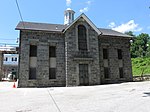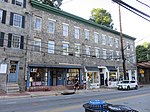Patapsco Female Institute
1837 establishments in Maryland1891 disestablishments in MarylandBuildings and structures in Ellicott City, MarylandEducational institutions disestablished in 1891Educational institutions established in 1837 ... and 10 more
Historic district contributing properties in MarylandHistory of women in MarylandHoward County, Maryland landmarksNRHP infobox with nocatNational Register of Historic Places in Howard County, MarylandReportedly haunted locations in MarylandSchool buildings completed in 1837Tourist attractions in Howard County, MarylandUniversity and college buildings on the National Register of Historic Places in New JerseyUse mdy dates from August 2023

Patapsco Female Institute (PFI) is a former girls' boarding school, now a partially rebuilt historical site, located on Church Road in Ellicott City, Maryland, United States. The grounds are home to popular outdoor theatrical performances by The Chesapeake Shakespeare Company. In the 1930s the Institute was also known as "Warwick".
Excerpt from the Wikipedia article Patapsco Female Institute (License: CC BY-SA 3.0, Authors, Images).Patapsco Female Institute
Church Road,
Geographical coordinates (GPS) Address External links Nearby Places Show on map
Geographical coordinates (GPS)
| Latitude | Longitude |
|---|---|
| N 39.270555555556 ° | E -76.796944444444 ° |
Address
Patapsco Female Institute
Church Road 3655
21043
Maryland, United States
Open on Google Maps








